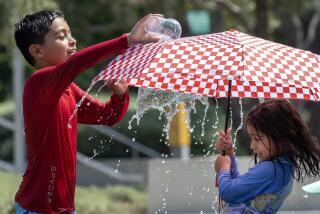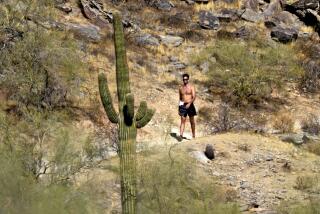Caltrans Workers Feeling the Heat : Hot stuff: Soaring temperatures and hot asphalt can turn the job into an inferno for road workers.
- Share via
The way Coy Hudson sees it, the worst blasted thing you can do on a hot day is talk about the heat. But you can’t help it.
Because the beast grabs you by the shoulders like some unrelenting interrogator that can beat out a confession from even the strongest-willed, the most hard-headed, of its prisoners.
This veteran Caltrans road worker should know. More than 13 years of toiling along scorching stretches of road from Dulzura to Del Mar, battling devilish midday temperatures, have taught him one hard lesson--the sun has no mercy.
But no matter how it tortures your body, he says, you must never dwell on its power. Because then it will take your mind as well, and elicit the words that come like a surrender:
It’s hot. God Almighty, it’s hot.
On Tuesday, Hudson and seven other road crew workers finished a two-day job laying asphalt along a desolate grade of California 67 north of Lakeside, near an outpost known as Vigilante Road.
It was a fitting name as temperatures rose into the 90s for the fifth straight day. For the sun, too, had become a vigilante--something lawless that had taken matters into its own hands.
If the sun weren’t brutal enough, the crew was dumping and spreading the asphalt that reached temperatures of 375 degrees--standing over it, raking it, their pores drinking in its heat like some outdoor sauna.
“Sometimes,” Hudson said, “you look up into the sky and you realize that the sun is your enemy. It’s almost like it’s out to get you. And it makes you pray for clouds. You pray for rain. You pray for anything but that sun.”
Nobody feels it like the county’s road crews, hearty men and women who often must labor in the most desolate backcountry locales where even the thought of a shady oak or eucalyptus tree is like some perverse joke.
It was 94 degrees in Santee, and 92 in Escondido on Tuesday. Although the heat spell is expected to end today with temperatures in the high 70s, these past days brought the sure signs that summer is coming.
For the Caltrans work crew, there were the long waves of heat that shimmer and rise from the roadbed like disturbed spirits. Then the hand tools that burn to the touch, the thermometer thrust into a sweaty work boot that can rise to 180 degrees--gauging the temperature of the road beneath your feet like the fires of hell.
Often, across the sweltering inland, the road Tarmac gets so hot it burns through your thick work boots, making you shift your steps as if you were running barefoot across hot sand.
And the stinging sweat. It trickles out from under your hard hat, dives straight for the eyes, making you wince and blink and almost gnaw off your work gloves just to be able to wipe it away.
Sometimes it’s as if someone was standing over your head with a bucket of salty, hot water--pouring it down the back of your neck, drenching your shirt, running in your mouth, clogging up your ears.
It makes you want to drink. On some days, Hudson says, you’d gulp down the entire ocean if you could. You jealously watch the bottled water trucks pass, and, every chance you get head for your water cooler, Thermos full of Gatorade or Big Gulp soft drink--your best friends on the job.
When the long day is finally through, you go home and use your sleeve to wipe your sweaty brow for the hundredth time. And you drink.
“When I finally get home, it’s like 6 or 7 o’clock before I finally get my thirst quenched,” Hudson said. “You stand in front of the refrigerator and you drink anything you can get your hands on, beer notwithstanding.”
Often, the sun already has workers cursing when they arrive on the job at 8 a.m. By lunch hour, they’re seeking the shade of nearby road signs or even the sweaty confines of some non-air-conditioned work truck.
But 2 p.m. is “Prime Time” when the sun launches its most-fevered assault--one that continues unabated for the rest of the afternoon.
The flying splatter of asphalt can burn like hot coals from a fire. And once it gets on clothing, workers say, it simply does not come out.
“Funny thing,” Hudson said. “The wind has a way of dying down right when we dump this stuff on the ground. You can’t get away from the heat. You look into that hot caldron of asphalt and wish you were anyplace else.”
On other jobs, crew members have become physically sick from the sun. Sometimes they even drenched each other with a hose from a water tanker--only to see the sun dry them completely in less than five minutes.
“Once, I got throw-up sick,” said worker Cathy Martinez, whose husband knows to have the air conditioner cranked full blast to greet her when she gets home each night. “The guys hosed me down and I had to sit in the shade of a big road sign for the longest while until I felt better again.”
Along with skin cancer, workers are always on the lookout for signs of heatstroke--especially on days when the sun’s rays are so fierce they can literally sunburn your eyeballs and make tempers shorter than firecracker fuses, said supervisor Don Modlin.
Modlin himself has experienced the queasy feeling in the pit of his stomach--the weakness and headache and skin that burns to the touch--the knowledge that the sun has gotten the best of him.
At age 46, he’s the most experienced on a crew whose resistance to the sun is as hard-baked as rawhide. Still, the tobacco-chewing Modlin has a deep-rooted respect for the sun.
Once, on a job somewhere near El Centro where the outdoor temperature registered 127, he stuck a thermometer in his boot. Soon, he read a breath-taking 180 degrees.
Other than laying asphalt, the worst job to land in the summer is that of flagman--a task that workers say requires you to stand around to battle the heat as the traffic whizzes past at breakneck speed.
It’s isn’t so much the insults or the apples hurled from passing cars that hurt, crewman say. It’s the idea that motorists just don’t understand how hot it can get.
Last year, a woman motorist called Caltrans to complain that she saw workers standing in the shade of a tree near a work site. The temperature that day was over 100 degrees.
But Martinez says that not all motorists have been so heartless.
A little old lady once brought the crew some homemade lemonade. “One guy drove by me, and then came back by a few minutes later to give me a soda,” she recalled. “He told me he couldn’t stand to see me looking so hot.”
At times, workers say, the sun gets you to thinking about things. Like how an occasional breeze can cool a sweaty body like that luxurious, fully clothed plunge into a swimming pool some guy takes in that old ice-tea commercial.
It makes you wonder why you ever requested that transfer from the comfort of a road crew job on the coast and how long you can possibly go without taking a drink. Because, as every road crewman knows, once you start guzzling fluids, you’re never able to stop.
And the sun makes you realize how long each and ever summer day really is.
“It makes you realize how little prestige this job has--with the rude drivers and the complaints and, of course, the heat,” worker Phil Moxley said. “But you have to learn to deal with it if you’re going to survive.”
Sometimes, he feels like a character in the 1967 movie “Cool Hand Luke,” in which Paul Newman plays a convict sentenced to a Southern prison road gang in the midst of a sweaty summer.
“The road boss always tells him, ‘Luke, if you wanna survive out here, you gotta grin and bear it. You gotta get your mind right, Luke.’
“That’s exactly how I feel.”
More to Read
Sign up for Essential California
The most important California stories and recommendations in your inbox every morning.
You may occasionally receive promotional content from the Los Angeles Times.











